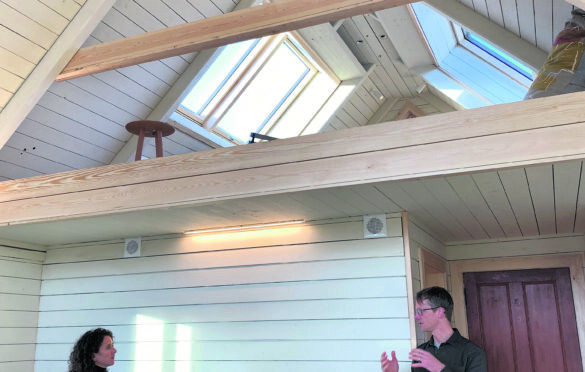Well, it was a certainly a showstopper. Despite the difficulties of convening a conference of this breath-taking size during a global coronavirus pandemic, Cop26 had a celebrity cast that ran to more than 120 heads of state and government, including the president of the United States, the heir to the British throne and support acts that included the nonagenarian People’s Advocate Sir Richard Attenborough at one end of the seniority scale and teenage activist Greta Thunberg at the angry other.
More significantly perhaps, the conference broadcast a sober message that reverberated across our collective consciousness – and while some may disagree with it, they can no longer ignore it.
National and local government lined up with academia, lawyers, the energy sector, manufacturers, designers, builders, fishermen and others to engage at an unprecedentedly granular level in the challenge of tackling climate change and achieving measurable net-zero carbon targets.
As an example, the Zero Carbon House at Cop26 designed by architect Peter Smith was a practical example of what can be achieved: an energy-efficient, timber home designed to store more carbon than is produced during construction.
Not just a temporary showcase built to impress Cop26 delegates, it was designed to be rebuilt in the Highlands as part of a sustainable housing development.
Stuart Goodall, Chief Executive of forestry and wood trade body Confor, said: “While Cop26 was an extremely positive event for forestry and wood for a number of reasons, it’s what happens next that will determine whether there is a meaningful legacy.”
THE GLASGOW LEADERS’ Declaration on Forestry and Land Use was, he believed, a welcome global recognition of the significance of growing trees and using more sustainably produced wood products to help tackle climate change.
“However, such declarations will only have impact if the UK takes more responsibility, and realises that action to protect global forests starts at home,” he said.
Scotland is showing leadership, planting 80 per cent of all new trees in the UK, with half of those intended to produce wood, supporting the fight against climate change while also adding £1 billion in annual value to the country’s economy and providing more than 25,000 jobs.
In the office and industrial property sector, gestures toward sustainability have been replaced by robust commitments that are increasingly demanded of the sector.
“Environmental matters have taken on an ever-increasing importance in recent years as both occupiers and investors strive to demonstrate positive sustainability credentials to employees and client base alike,” said Stewart McMillan, a Partner at commercial real estate services firm Cushman and Wakefield.
“This is driven by the desire of many employees to work with an organisation that demonstrably wants to make a positive contribution to the future of the environment and the desire from clients to know their money is being invested responsibly.”
WHILE INTEREST IN sustainability across the property industry significantly pre-dates Cop26, he believes the conference has greatly raised its profile in the sector.
“This of course is very important but it’s now essential to harness that momentum and deliver further positive change. Ultimately, the impact of Cop26 will be judged on delivering tangible results and Cop27 in Egypt in November will provide an early opportunity for progress to be scrutinised.”
The sometimes-rarefied world of finance and investment management has not automatically been associated with an urgent desire to combat climate change, but Glasgow last year lent its name to the Glasgow Financial Alliance for Net Zero (GFANZ), a confederation of 450 major financial institutions from across 45 countries (see financial services, page 8).
While there has been a broad shift towards corporates setting real targets to reach net-zero emissions, within the financial sector there hadn’t thus far been a robust methodology for how banks or asset managers might achieve that, which GFANZ aims to provide.
The University of Glasgow’s response to the climate emergency, Glasgow Green, sets out a climate change strategy and action plan and follows the declaration of a climate emergency in May 2019 by the university’s principal, Professor Sir Anton Muscatelli.
WHILE HE SAID it was incredibly important for Glasgow, Scotland and the world that global leaders gathered in the city to discuss and agree action to tackle climate change, Cop26 was never just about two weeks last November.
“Now the vital work starts to deliver the ambitious goals set out in our Glasgow Green sustainability strategy and as Principal of the University I want to ensure that the UN climate summit leaves a meaningful, successful and lasting legacy.”
Dr George Baxter, chief executive officer of Edinburgh Innovations (EI), the University of Edinburgh’s commercialisation service, agreed that Cop26 demonstrated that sustainability must now be at the heart of our economy and at the top of all business agendas.
“The conference emphasised that climate and sustainability challenges present clear risks and benefits for every organisation and industry sector,” he said.
“As a university, our responsibility is to translate our knowledge – from renewable energy technology to climate finance, net zero construction and sustainable agriculture – to mitigate climate change and manage its effects. By working in partnership with industry to achieve this we can amplify the societal impact we can have both locally and globally.”


Environmental matters have taken on an ever-increasing importance for both occupiers and investors
Stewart McMillan



